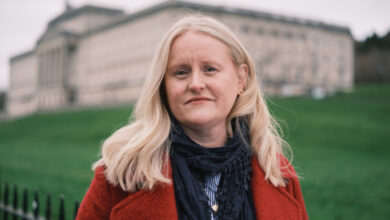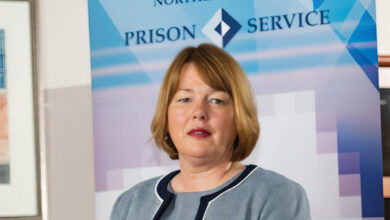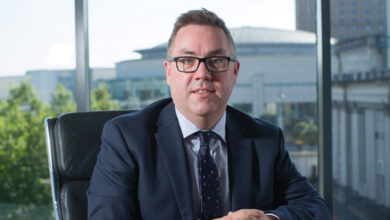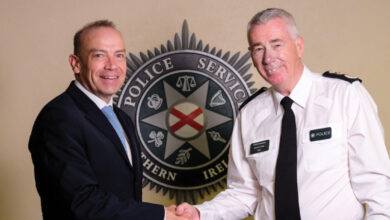Bloody Sunday truth
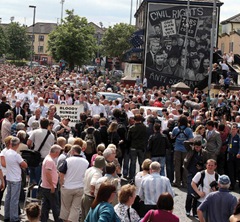 Following the release of the Saville report, agendaNi summarises the reactions of leading political figures and clergy.
Following the release of the Saville report, agendaNi summarises the reactions of leading political figures and clergy.
A heartfelt apology from the British Prime Minister heralded the long awaited arrival of the Saville Report into the events of 30 January 1972: Bloody Sunday.
“I never want to call into question the behaviour of our soldiers and our army who I believe are the finest in the world,” David Cameron said. “But the conclusions of this report are absolutely clear … What happened on Bloody Sunday was both unjustified and unjustifiable.”
The report, which concluded that those who were killed and injured in Derry were innocent, and that the soldiers fired the first shots and put forward false accounts of their actions, was largely accepted across Northern Ireland.
However, a number of unionists criticised it for costing almost £200 million and taking 12 years to complete in light of no similar inquiries being carried out into other atrocities.
Objectivity
Tony Blair announced the Saville inquiry in 1998. Lord Widgery claimed that shots had been fired at the soldiers before they started firing.
The Widgery report had been released 11 weeks after Bloody Sunday and was criticised as being a “white-wash”. Following Cameron’s apology, a copy of that report was torn in two on the steps of the Guildhall in Derry by the families of the 14 men who were killed.
During the Saville inquiry, 2,500 people were interviewed or gave statements. Oral evidence was given by 505 civilians, 245 military witnesses, 49 media representatives (including photographers), 39 politicians and civil servants (including intelligence officers), 35 paramilitaries or former paramilitaries, 33 RUC officers, nine experts and forensic scientists, and seven priests. It ran to 5,000 pages and cost £190.3 million to the end of February 2010. It is estimated that legal fees will account for a further £10 million.
First Minister Peter Robinson accepted the report’s findings that what happened was wrong and unjustified. “After the length of time, the detail that is provided in that report, I think you cannot pick and choose the elements of that report that you accept and those that you do not,” he said.
Martin McGuinness told the BBC’s Spotlight programme: “To see a British law lord and a Tory Prime Minister point a finger at the British army is a momentous day for the families and people of Derry.”
Leadership
Denis Bradley, the former priest who administered last rights on the day, wrote in the Irish News: “I have never been a supporter [of David Cameron] but, if he was in the room, I would want to shake his hand and compliment him for the leadership he is taking. Saville probably left him with no choice but when a politician speaks words that are healing and reconciling, that needs to be acknowledged.”
Dr Edward Daly, the retired Bishop of Derry who appeared in an iconic photo from that day waving a bloodied handkerchief while helping to carry a body, said: “I feel an enormous relief that this burden has been lifted off my shoulders and off the shoulders of the people of Derry. It’s wonderful when the truth emerges, when people whose characters have been sullied are vindicated.”
The day after the report was released, three senior Protestant church leaders met with members of the families: Bishop of Derry and Raphoe Ken Good, Presbyterian Moderator Rev Norman Hamilton, and Methodist President Rev Paul Kingston.
Following their meeting they stated: “A cloud that has been hanging over this city for almost four decades has begun to lift. Our hope is that the Saville report will bring comfort and relief to the families who lost loved ones as a result of that fateful day. We believe that the report presents a challenge and an opportunity for new and closer relationships within our wider community. We wish to contribute to and to feel part of a self-confident, welcoming city that is at peace with itself.”
MPs immediately reacted to Cameron’s statement in the Commons.
Mark Durkan asked if the Widgery report could be discredited in light of Saville’s findings. He added: “If today, as I sincerely hope it does, offers a healing of history in Derry and Ireland, may we pray that it also speaks hope to those in other parts of the world who are burdened by injustice, conflict and the transgressions of unaccountable power.”
Cameron responded: “the Widgery report is now fully superseded by the Saville report; this is the report with the facts, the details and the full explanation of what happened, and it should be accepted as such.”
East Londonderry MP Gregory Campbell told the Commons: “There have been 10,000 other bloody days in Northern Ireland’s recent history. They have had no costly inquiries and no media interest.”
He asked Cameron if he agreed that “the sorry saga of the report is finally over and done with, and that we should look forward, rather than looking back?”
Cameron responded: “Let us not pretend that there is not something about that day that needed to be answered clearly in a way that can allow those families to lay to rest what happened.”
Martin McGuinness, who the report says, “was possibly” carrying a gun on Bloody Sunday told the Spotlight programme:
“I didn’t have a gun. There are photos of me on the march without a gun. These allegations came from a highly suspect source to the tribunal. It is absolutely untrue.”
The UUP’s Reg Empey pointed out that 1972 was the “bloodiest” year of the Troubles with 496 people killed. He criticised how Saville addresses “one set” of victims, while ignoring others and added: “any attempt by republicans to use Bloody Sunday to retrospectively justify three decades of terrorism is a perversion of history.”
The inquiry had left many people asking whether “38 years after the events of that confusing day in January 1972, the public interest is served in prosecuting soldiers but not the godfathers of terrorism?” Empey concluded that there should be “no more Savilles”.
Alliance’s Stephen Farry claimed: “It was right that Bloody Sunday was properly investigated and the rogue conclusions of Widgery consigned to the dustbin of history.”
He believes that Saville “closes one chapter” but also raises questions about prosecutions. Any prosecutions will be considered independently by the Public Prosecution Service. Farry also called for the Government to clarify how the past could be dealt with in a way that builds a shared future.
Brian Cowen praised the “brave and honest words of David Cameron which will echo around the world” and John Hume stated: “The people of Derry have always known that everyone shot on Bloody Sunday was entirely innocent. With the publication of the Saville Report, the British state has acknowledged their innocence and that its army murdered on that day.”

